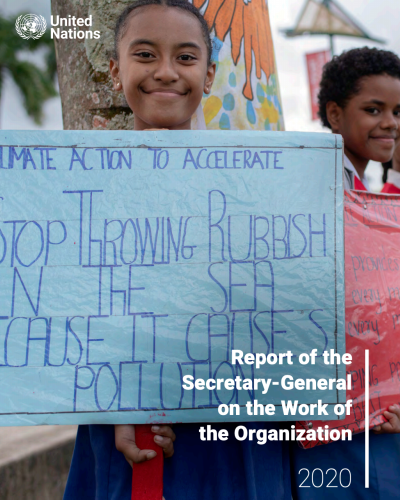Report of the Secretary-General on the Work of the Organization

In 2020, as the United Nations celebrates 75 years since the Charter’s signing, we have an opportunity to reflect on our shared progress, as well as our common future. Our vision and values – based on equality, mutual respect and international cooperation – helped us to avoid a Third World War, which would have had catastrophic consequences for life on our planet. For 75 years, we have forged productive cooperative rela- tionships for global problem-solving and the common good. We have put in place vital norms and agreements that codify and protect human rights, set ambitious goals for sustainable development and charted a path towards a more balanced relationship with the climate and the natural world. Billions of people have emerged from the yoke of colonialism. Millions have been lifted out of poverty.
Today, day in and day out, around the clock, around the world, the United Nations is helping to save millions of lives every year. Women and men of the United Nations are assisting 80 million refugees and displaced people and enabling more than 2 million women and girls to overcome complications from pregnancy and child- birth. Over 40 political missions and peacekeeping operations comprising 95,000 troops, police and civilian personnel strive to bring and keep the peace and to protect civilians. Our electoral assistance now extends to 60 countries each year, and our help for victims of torture reaches 40,000 people. Some 7,500 monitoring missions every year seek to pro- tect human rights, make violations known and hold perpetrators accountable.
Yet these efforts have not been enough to hold back the tides of fear, hatred, inequality, poverty and injustice. Moreover, early in 2020, we were brought to our knees by a microscopic virus: the virus responsible for the coronavirus disease (COVID-19) pandemic has taken a horrific toll on individuals, communities and societies, with the most vulnerable disproportionately affected.
The pandemic has demonstrated the fragility of our world. It has laid bare risks ignored for decades: inad- equate health systems; gaps in social protection; structural inequalities; environmental degradation; the climate crisis.
The United Nations family mobilized quickly and com- prehensively, leading on the global health response, continuing and expanding the provision of life-saving humanitarian assistance, establishing instruments for rapid responses to the socioeconomic impact and laying out a broad policy agenda in support of the most vulnerable communities and regions.1 But the setback to the fundamental Charter goals of peace, justice, human rights and development has been deep and may be long-lasting.




















